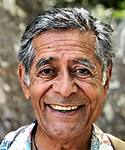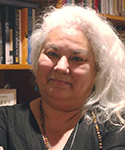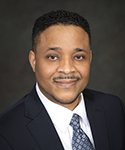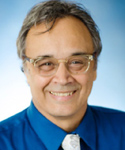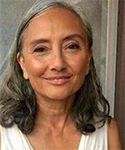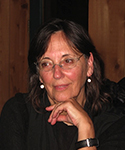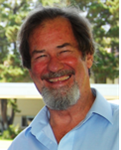Integrative Therapy and Healing Practices
Now Accepting Applications for Fall 2026
An innovative doctoral specialization that re-imagines approaches to therapeutic practice, enhances and supports the individuation work of students, and integrates the essential perspectives of depth psychology and applied healing traditions.
Request More InformationPh.D. in Depth Psychology with Specialization in Integrative Therapy and Healing Practices
About Integrative Therapy and Healing Practices
State Authorization: Click to View States Pacifica is Authorized to Enroll By Program.
This doctoral specialization cultivates an integrative approach to professional development in the art and science of therapeutic practice. Working with leading faculty, Pacifica students engage in a journey of personalized education that fosters advanced therapeutic skills and practices, and which supports them in making important and original scholarly contributions to their fields.
For established and emerging practitioners, we invite you to join a diverse group of academic and practice-oriented professionals who are called to deepen their therapeutic work through an integrative study of healing based on the visionary aspects of depth psychology. Become a part of a learning community focused on exploring the critical connections between psychology, spirituality, and healing.
We welcome students with a deep personal calling to their therapeutic work, individuals with profound curiosity about themselves and the world, and lifelong learners devoted to a transformative engagement with the numinous, the psyche, and the natural world.
In five-day quarterly residential learning retreats surrounded by the natural landscape of Pacifica’s beautiful campus, students and faculty work together to integrate essential healing traditions and contemporary research—drawing from indigenous and ancient practices, multicultural and contemporary perspectives, and emerging science on human experience and consciousness.
Lionel Corbett Discusses Therapy Based on Depth Psychology
Program Schedule
This program has a hybrid model, meaning classes meet once a term on campus for five days during the Fall, Winter, and Spring terms. Studying, assignments, online discussion posts, and readings are completed in between class meetings along with two weekend videoconference meetings. The on-campus classes offered once a term are from Monday-Friday. There will be three campus visits a year. No courses are offered during the Summer quarter, although registration for dissertation work is required.
For Diverse Practitioners
The Ph.D. in Depth Psychology with Specialization in Integrative Therapy and Healing Practices requires master’s-level education and training in a distinct healing-oriented profession. The program is ideal for diverse practitioners in the following professions, including (partial list):
- Psychotherapists and Psychologists
- Marriage and Family Therapists, Social Workers, and Professional Counselors (licensed or pre-licensed)
- Health and Medical Professionals (Nursing, Physicians, Allied Health Providers)
- Jungian Analysts and Psychoanalysts
- Specialized Addiction and Treatment Counselors
- Expressive Arts Therapists
- Spiritual and Pastoral Counselors
- Health and Wellness Practitioners with Advanced Training
- Other Qualified Consultants and Counselors
Students develop important mentoring relationships with Pacifica’s unique faculty of clinicians and scholars who include: Jungian analysts, clinical psychologists, psychiatrists, psychodynamic therapists, systems therapists, archetypal psychologists, spiritual counselors, health and medical professionals, and advanced scholars in research, mythology, and the humanities.
Benefits
This academic specialization includes nine quarters of coursework over three academic years, followed by writing an original dissertation emanating from the student’s own selected area of research interest. Students in this program:
- Join an advanced doctoral cohort of diverse professionals collaborating and deepening their work with clients and themselves.
- Explore the growing field of depth psychological research and develop perspectives that help address the critical needs of our world.
- Develop a greater capacity to work symbolically with images, dreams, symptoms, complexes, and synchronicity.
- Work towards becoming advanced practitioners, academic educators, supervisors, or scholarly researchers in the field.
- Examine the critical underpinnings of therapeutic processes and the broad range of theoretical approaches to mental, physical, and spiritual well-being.
- Build mentoring relationships with distinguished faculty and experts devoted to supporting students in deepening their practice and their individuation journey.
- Study the works of leading scholars who have bridged psychological, cultural, mythological, historical, and social traditions to advance broader understandings of human experience.
- Develop advanced skills in important practice areas, such as somatic healing, sexuality, dream work, and spirituality.
- Investigate the important connections between the health of an individual or group and the health of their environment and culture through courses that consider ecology, collective trauma, social justice, and cross-cultural dynamics.
The Meaning of Integration in the Context of Healing
Contact the Admissions Advisor
- Michael Mirabella, Admissions Advisor
- Phone (call or text): 805-881-1311
- Email address: mmirabella@pacifica.edu
Compassionate Care and Being Asian in America in COVID-19
Featured Blog Posts
- Psyche and the Sacred with Lionel Corbett
- My first days at Pacifica: First year student reflections with Winston Alston
- Depth Psychological Approaches to Suffering with Dr. Lionel Corbett
- Psyche’s Knife: Archetypal Explorations of Love and Power by Elizabeth Éowyn Nelson, Ph.D.
- The Forgotten Child: An Interview with Juliet Rohde-Brown, PH.D.
- The Quality of Her Presence: An Interview with Pat Katsky, Ph.D.
- The #SunMoonWorldTour: Catching up with Pacifica’s Minh Trần, Part I of II
- Journey Week 2024: Beyond Boundaries Mandala: An Interview with Susan Evergreen Hericks, Ph.D., and River Sauvageau
- Woman of Light: An Interview with Isha Lucas, Part II of II
- In Her Element: The Indigenous Psychology of Flower Essences
- The Ofrenda Ritual; Bridging Art and Death
Career Pathways
Most students who enter this program have established careers, licenses, and certificates in particular areas of psychotherapy and other healing arts. There is a focus on research as relevant to applied practices and transdisciplinary frameworks. Post-graduate opportunities exist in higher education, authorship, workshop leadership, and deepening within the legal and ethical guidelines into one’s chosen profession. Students also attend the DPH program to create community-based endeavors to support the voices and experiences of marginalized individuals and groups.
Scholarships
Education Assistance The Education Assistance Scholarship is sponsored by Pacifica Graduate Institute and offered to new and returning students based on extreme financial hardship and strong academic excellence. Awards are made annually at the beginning of each academic year. The award is $1,000 to be equally divided over the academic year. This scholarship is not renewable, and students must apply each academic year. Students enrolled in the PhD and PsyD Dissertation phase of their programs are not eligible for scholarship consideration. Yellow Ribbon Matching Scholarship Pacifica Graduate Institute is pleased to announce that we have entered into an agreement with the Veteran’s Administration in support of veterans continuing their education under the Post 9/11 GI Bill. Pacifica has agreed to provide up to ten Yellow Ribbon Scholarships each year for qualifying veterans under the Post 9/11 GI Bill on a first-come first-serve basis. Students in the M.A. Counseling program will qualify for up to $6,500 per year, M.A. Engaged Humanities and Creative Life will qualify for up to $5,400 per year, and those in the doctoral programs will qualify for up to $7,800 per year. C.G. and Emma Jung Scholarship Offered to newly admitted students entering into the Ph.D. Depth Psychology with Specialization in Integrative Therapy and Healing Practices. Average awards range from $2,000-$3,000. The number and amount of individual awards is contingent upon the number of eligible applications received. This scholarship is renewable provided recipients meet the required grade point average.Request Information
Learn MoreChair & Faculty
The faculty of Pacifica’s doctoral program in Depth Psychology with specialization in Integrative Therapy and Healing Practices are leaders in the field: authors of international acclaim, renowned lecturers, Jungian analysts, clinical psychologists, registered nurses, and philosophers. Each brings a passion for education and decades of real-world experience into the classroom.
Curriculum Overview
Students matriculating in the Ph.D. in Depth Psychology with Specialization in Integrative Therapy and Healing Practice in Fall 2024 or later, will come to campus for residential sessions once each quarter for 5 days, Monday through Friday. They will have additional videoconferencing attendance requirements two weekends per quarter as well as web-enhanced learning components such as recorded lectures and discussion posts. There will be no summer quarters.
This curriculum may vary depending upon changing academic needs. Selected courses may have online components. The required two-year dissertation period, following coursework, focuses on scholarly research and writing.
The program will also feature a quarterly Somatic Practice Consultation Intensive and an annual Spring Advanced Depth Seminar for years 2 and 3. Special seminars and lectures may focus on a range of important practice areas, such as: Addictions, Dream Tending, Family Systems Theories, Sexuality and Gender, Organizational and Group Dynamics, Jung and Shamanism, Expressive and Therapeutic Arts, Healing Mythologies, Sociopolitical Contexts and Cultural Complexes, Adverse Childhood Experiences and Wellness, Shadow and Power in the Healing Professions, The Meaning of Integration, Evolution of Jungian Analysis, James Hillman’s Cultural Critique of Psychology, Alternative Healing Arts, Inner Life and Trauma, Somatic and Implicit Processes, Jung’s Red Book, Indigenous Healing Traditions, Treating the Soul in the Health and Medical Professions, Yoga Therapy, Therapeutic Vocations and Careers, and other current issues and movements influencing the healing professions.
19.5 Total units for first year | 20.5 Total units for second year | 19 Total units for third year
Total program units: 74 Units (59 Units in coursework, 15 Units in dissertation)
First Year
- Imaginal and Experiential Dimensions of Therapeutic Practice - DPH 962, 2 units
- Cultural Dimensions of Psychological Life: Engaging Collective Trauma, Cultural Healing, and Social Justice - DPH 830, 2 units
- Archetypal Psychology: Re-Visioning Approaches to the Psyche - DPH 762, 2 units
- Selected Topics I - DPH 974, .5 units
- Dissertation Development I: Imagination, Calling, and Rigor in Doctoral Scholarship - DPH 832, 2 units
- Healing Narratives: Writing Compelling Practice Studies and Client Stories - DPH 785, 2 units
- The Relational Field I: Theoretical Distinctions and Expanded Paradigms - DPH 763, 1.5 unit
- Practice Consultation Groups I - DPH 750, 1.5 unit
Second Year
Third Year
- Jungian Psychology and Contemporary Healing II: Engaging Complexity and Diversity - DPH 861, 2 units
- Working with Illness and Death: East-West, Depth, and Indigenous Perspectives on Suffering - DPH 894, 2 units
- Body, Mind, and Soul in the Healing of Trauma: Somatic, Neurological, and Archetypal Approaches - DPH 975, 2 units
- Practice Consultation Groups V - DPH 852, 1.5 unit
Continuing
Requirements for Graduation
Requirements for Graduation
- Students must complete a total of 74 quarter units to fulfill the degree requirement for graduation.
- A minimum grade of “C” is required in each completed course.
- A cumulative grade point average of 3.0 must be maintained.
- Students must comply with attendance requirements as stated in the Student Handbook.
- Students must successfully pass a comprehensive written examination at the end of the second year of coursework.
- Students must successfully present a Control Paper describing their therapeutic or depth-oriented practice work with a particular client, family, or select group to two faculty members during the third year of practice consultation courses.
- Students must successfully complete a comprehensive oral presentation in the final spring quarter of coursework.
- Students must write, submit, and defend an original dissertation accepted by the faculty.
- Students are required to take part in 50 hours of depth-oriented therapy, counseling, analysis, or an engaged self-reflective process with a provider in their field while enrolled. This is required for graduation and strongly recommended to support students in their educational experience in the program.
Education Requirements
The Ph.D. in Depth Psychology with specialization in Integrative Therapy and Healing Practices is designed specifically for those who, before enrolling, already are licensed or have sufficient academic and other credentials to pursue their chosen professional practice in compliance with applicable guidelines and regulations within their jurisdiction. The degree provides in-depth education in theory, applied contexts, and related-research contexts. Unlike the counseling and clinical doctoral programs at Pacifica Graduate Institute which have developed curricula and clinical training support for those wishing to sit for licensure exams to become psychologists, this specialized depth psychology program does not arrange, authorize, monitor, or supervise practice for licensure purposes.
Comprehensive Examination
The comprehensive examination consists of a written portion taken at the end of the second year and an oral portion taken at the end of the third year. The written exam is divided into three sections corresponding to the three study tracks of the specialization: Theory and Traditions of Depth Therapy; Psychology; Therapy, Counseling, and Healing Practices Informed by the Humanities, Arts, and Sciences; and Integrated Praxis: Research and Applied Contexts. It is designed to assess knowledge gained in the first two years of coursework and serves as a qualifying exam for students before continuing into the third year of study. Students in the Integrative Therapy & Healing Practices specialization who have successfully completed at least 29 units of Ph.D. coursework and who are in good standing are eligible to complete the written comprehensive examination. The third year oral examination consists of the student’s formal oral presentation addressing the ways the program has informed their work and their proposed dissertation topic..
Control Paper
During the third year Practice Consultation Group series, each student presents a control paper that demonstrates their applied work and the ability to synthesize a variety of appropriate therapeutic and/or healing arts perspectives while maintaining their own unique style of practice.
Doctoral Dissertation
The dissertation process involves the completion of all coursework in research methodologies, dissertation development, and dissertation writing. Requirements and procedures for enrolling in dissertation writing are detailed in the Dissertation Handbook. The Dissertation Committee is composed of a Chair, a Reader, and an External Reader. Each committee member must possess an earned doctorate based in part on a dissertation unless the Research Coordinator for the specialization waives this requirement.
The curriculum may vary depending upon changing academic needs. Selected courses may have online components. The required two-year dissertation period, following coursework, focuses on scholarly research and writing.
Program FAQs
What is a “hybrid” program?
A hybrid program combines learning in residential sessions with assignments, writing, and readings to be completed between residential sessions as well as minimal videoconferencing meetings. Pacifica utilizes D2L as our learning management system.
What kind of work is required in between residential sessions?
In between residential sessions, there will be required posts on D2L as well as videoconferencing. As stated above, there is much reading and writing between residential sessions.
How many hours of work are required in between residential sessions?
The hours of work depend on the unit load for each course. In addition to reading, viewing lectures, and writing assignments and required posts to D2L, videoconferencing sessions are required on two weekends per term.
Does the required master’s degree for entrance need to be in psychology?
No, the degree may be in any field and our students come from a variety of backgrounds. Commonly we see therapists, healing practioners, teachers, medical professionals, and others apply.
Does this program prepare for licensure?
No, as this program requires a master’s degree, we do have students who already have various licenses. However, this program does not have a licensure component. It does have a dissertation component.
Enroll Today
Apply NowAll of Pacifica Graduate lnstitute’s degree programs are accredited by the Western Association of School and Colleges (WASC) and federal financial aid is available for those who qualify.
*Pacifica does not provide the supervision of practice hours that may be required for licensure or any similar purpose. Students must provide for their own insurance coverage for professional liability. This curriculum does not contain any license-specific coursework and should not be considered as helpful in that regard. Furthermore, although students will engage in some form of therapeutic practice while in this specialization, and may consult with faculty about their practice, Pacifica does not authorize, monitor, or supervise that practice for licensure purposes, nor do we arrange or administratively support traineeships, pre- or post-doctoral internships, or other licensing practice requirements. The curriculum may vary depending upon changing academic needs. Selected courses may have online components. The required two-year dissertation period, following coursework, focuses on scholarly research and writing.









